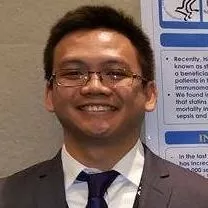
Name: Raymond Francis Sarmiento, MD
Job Title & Company: Public Health Informatics Fellow, U.S. Centers for Disease Control and Prevention (CDC)
Location: I am the first and only CDC fellow based outside of Atlanta. I have been based in Cincinnati, Ohio since 2014 because I joined the fellowship program with a lot of health informatics experience primarily because of my prior NLM fellowship. The Public Health Informatics Fellowship (PHIF) program was looking to pilot test how to send out a fellow into the field, if you will, so they asked if I was willing and I said yes. They wanted to try and see if that could be a successfully proven approach in providing informatics technical expertise and support to CDC institutes located outside of Atlanta. I would say that the whole experience has been a success so far, not only in terms of my work here within my institute (National Institute for Occupational Safety and Health or NIOSH) but also for the PHIF program as well.
How long you’ve been in your current job: Nearing the end of my two year fellowship at CDC
Postdoc Advisers, IC: Dr. Paul Fontelo (medical informatics training director at Lister Hill National Center for Biomedical Communications) and Dr. Clement McDonald, Director of the Lister Hill National Center for Biomedical Communications at the National Library of Medicine (NLM), U.S. National Institutes of Health
What was your career progression after NIH like?
After finishing my two-year postdoctoral clinical informatics fellowship at the NLM, I moved to an applied training fellowship on public health informatics over at the CDC. I’m currently at the CDC, doing work on occupational health surveillance, epidemiology, electronic health records, data analytics, and natural language processing.
What is your day to day like in this role?
The work that I do is a mixture of public health project management as well as conducting research on improving public health using informatics techniques and problem-solving frameworks. In a typical day, I connect with key project stakeholders, including the software engineering team, content development and management team, and internal and external users. On a near daily basis, I communicate the progress we have made on each of the projects to the respective project managers and team leaders. As a team, we work together on improving our health information systems, mostly occupational health surveillance programs and consumer tools, that have been developed here in NIOSH.
How did you find this opportunity?
It was something that I had known about prior to my NLM fellowship because I had previously applied to PHIF in 2010. When it was time to move forward with my career, I felt the need to gain more applied informatics training experience, particularly in public health, mainly because I wanted to expand my horizons in terms of being able to find and apply practical informatics solutions to real-world public health problems.
For individuals who are interested in a public health informatics fellowship, do you have any insights on what would make them a competitive candidate?
Being able to show that you possess a strong foundation in terms of understanding health informatics concepts and that you are competent in your statistical analysis skills are things that are strongly desired for PHIF candidates. A candidate’s willingness to learn is also a critically important qualification. Aside from those, having previous research and/or evaluation experience will help the would-be fellow succeed in PHIF.
What is your favorite aspect of your current job?
My favorite aspect is being given the chance, on a daily basis, to gain valuable experience and exposure to the workings of public health surveillance and epidemiology as it is conducted in the United States. I value my time and experience here because I believe it will help me in the long term especially when I return to the Philippines, which is my home country. Working in one of the top public health institutions in the world and the premier public health agency in the United States has given the chance to collaborate with the top scientists in the field and this has helped me understand the best practices in terms of implementing informatics solutions to public health problems.
Your work sounds like an intersection of two very popular fields – public health and health informatics. So, what are you hoping to do next after your fellowship?
After the fellowship, I intend to return to the Philippines because I am highly interested in establishing the public health informatics field back home. At present, there are no companies or government agencies in the Philippines that focus on using health informatics frameworks and solutions to local public health problems. Another idea is to join the Philippines’ Department of Health as a public health informatics expert or maybe even be our country’s health informatics czar as the Philippines continues to develop and successfully its national long-term plans for e-health and telemedicine. In addition, I am also open to opportunities where I can apply both my clinical and research expertise, maybe in roles such as Chief Medical Information Officer, Senior Health Data Scientist, or Clinical Research Director who deals with clinical informatics projects.
What are the most important skill sets that you utilize?
Definitely, effective communication skills and the ability to constantly improve are critical skills one needs to use every day. By effectively communicating your message to your intended audience, particularly to key stakeholders and champions who will can greatly influence the outcome of your project, your project is likely to succeed and meet your target outcomes. I cannot emphasize this enough.
For somebody who wants to go down a similar path like yours and get more experience in both clinical and public health informatics, what would you recommend to them?
I would say that the most crucial thing for early career scientists is to identify a mentor or scientist who you would like to emulate or model your career after. If you do your research and are able to realize that “Yes, this is the career arc that I want to experience... This is the career that would help me grow into the best version of myself as a scientist.”, then by all means do everything you can to try to connect with that individual. Take advantage of what you can learn from your mentors. Ask for the necessary support and guidance that you will need for you to be on your way to your desired career path. Another thing, especially for foreign nationals who are experiencing living in the United States for the first time, is to not be afraid to contact the “fathers” or “mothers” of your chosen field. Often, we feel intimidated so we hesitate in doing this, but you truly won’t know if they will be open or not to helping you unless you try. If everything falls into place, then you have taken that first big leap of working toward your goal to becoming the best scientist that you could possibly be. Furthermore, constantly improving yourself and looking for ways to build your capacity in areas where you feel you need to improve -- maybe in machine learning, maybe in regression analysis, whatever it may be – will contribute immensely to your future success.
When you look at your career to date, is there anything you wish you had done differently?
probably would have applied for the NLM fellowship a few years earlier in my career. Being on the same career trajectory but on an earlier timeline, I would have likely been working on helping to improve the public health agenda in the Philippines a couple years earlier. But overall, I have no regrets, only a profound appreciation of what I have been given and how much I can contribute towards helping my home country.




